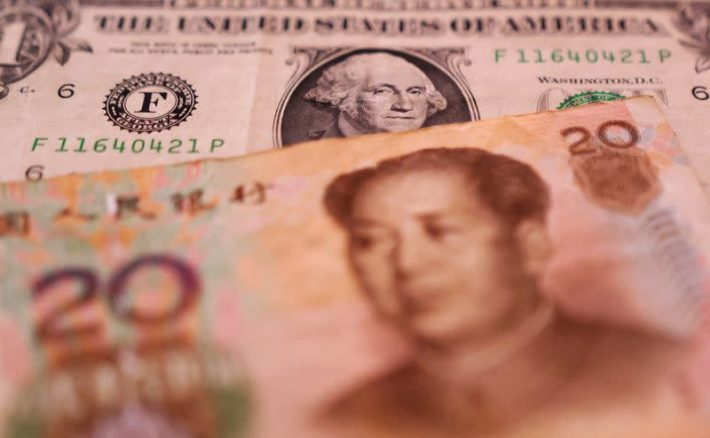Chinese authorities have ramped up move to stop the yuan weakening further, multiple sources say.
Major state banks have slashed their dollar deposit rates for the second time in a month, seven sources said.
Interest rates offered by the “Big Five” state-owned lenders on most dollar deposits are now capped at 2.8% – down from 4.3% previously, the sources, who declined to be named, said.
The People’s Bank of China, which typically issues guidance on dollar deposit rates to state banks, has yet to comment on the matter, while key lenders – Industrial and Commercial Bank of China, Bank of China, Agricultural Bank of China, China Construction Bank and Bank of Communications – also did not respond to requests for comment.
ALSO SEE: China Move to Block Chipmaking Metals Spurs Supply Fears
Bid to stop dollar being stockpiled as yuan sinks
Traders and analysts said policymakers, worried that a prolonged yuan slide could both discourage foreign investment and spur an outflow of funds abroad, want to bring down dollar deposit rates – which typically track offshore rates – towards domestic rates, which have been cut to aid the flagging economy.
The yuan is one of the worst-performing Asian currencies this year, knocked nearly 5% lower against the dollar by a slowdown in China’s economy and widening yield differentials with the United States.
“It shows that the move is to narrow the interest rate advantage of the US dollar in onshore markets,” Ken Cheung, chief Asian FX strategist at Mizuho Bank, said.
“It is likely aiming to prevent stockpiling dollars and encouraging (foreign exchange) settlements.”
The lower rates could both discourage households from putting savings into higher-yielding dollar deposits and nudge Chinese firms, especially exporters, to settle foreign exchange receipts in yuan.
New rates from July 1
The new rates came into effect on July 1, said two of the sources, adding that some of the banks were not offering rates above the 2.8% cap for large deposits. Banks typically offer higher rates to deposits exceeding $1 million.
The PBOC, China’s central bank, has recently moved to brake the yuan’s slide against the dollar, setting stronger-than-expected daily fixings for the currency, while state banks have also been spotted selling dollars on occasion in both the onshore and offshore markets, trading sources said.
The latest cut in dollar deposit rates was the second in barely a month. In early June, sources said the big state banks had lowered such rates as much as 100 basis points from the previous ceiling of 5.3%.
Sources also said last week that the central bank has surveyed some foreign banks about the interest rates they offer to their clients for dollar deposits.
The PBOC said last Friday it would continue to keep the yuan basically stable and guard against the risk of large exchange rate fluctuations.
Some currency traders also said the cuts in dollar deposit rates would ease pressure on commercial lenders’ net interest margin, as banks’ dollar deposit rates had risen above lending rates before the recent adjustments.
The latest PBOC data showed that the weighted-average interest rate on large dollar deposits stood at 5.67% in March, up 4.15 percentage points from a year earlier, while the weighted-average dollar lending rate was up only 3.74 percentage points at 5.34%.
- Reuters with additional editing by Jim Pollard
ALSO SEE:
China Forex Chief Pan Gongsheng ‘to be New Central Bank Boss’
Chinese State Banks Selling Dollars to Slow Currency’s Decline
Yuan Falls to 7-Month Low as China Cuts Prime Lending Rates
























